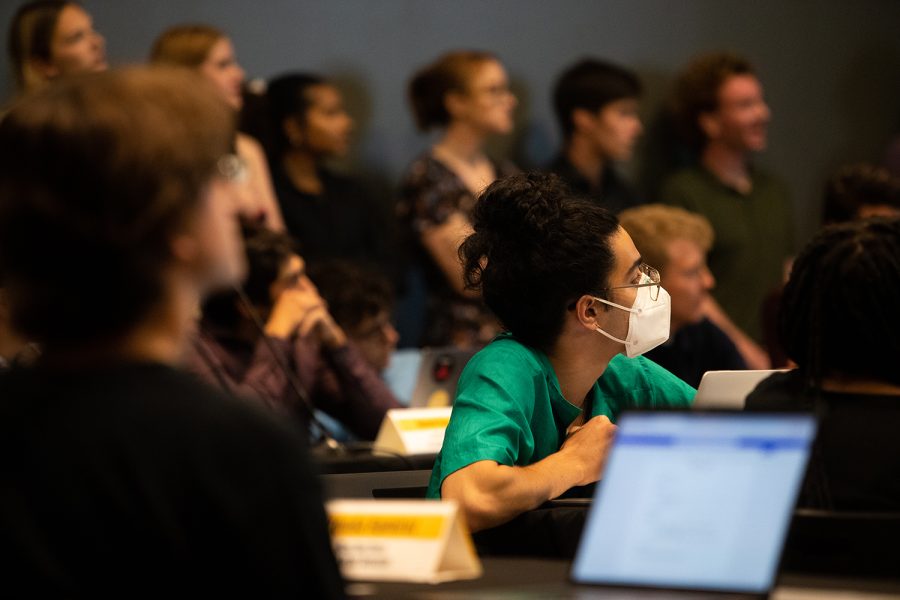UI USG announce changes to election code to increase accessibility
Changes to the code include a quota on the maximum number of undergraduate student government senators allowed per election petition.
Senators sit in at an Undergraduate Student Government Meeting in the Black Box Theater in the IMU on Tuesday, Sept. 20, 2022.
March 1, 2023
Members of the University of Iowa Undergraduate Student Government made changes to the organization’s election code, meant to increase non-USG participation in elections and accessibility.
Alivia Rosendahl and Boris Miller, the Undergraduate Student Government student election commissioner and assistant commissioner, gave a presentation at the Feb. 21 meeting highlighting changes to the election code.
One change to the elections code made to increase the accessibility of elections to non-USG members was the institution of a new quota regarding signatures on the petition, Miller said at the meeting.
The new policies include:
- No more than 12 signatures for senatorial tickets may be active USG members
- No more than 30 signatures for executive tickets may be active USG members
Before the Feb. 21 meeting, the Undergraduate Student Government elections code — as a result of the COVID-19 pandemic — was not updated since 2020, Rosendahl said in an interview with The Daily Iowan.
“The Student Judicial Court was kind of lost in the mix of [the pandemic], and now we’re kind of coming back to it and we’re approaching it with fresh eyes,” Rosendahl said.
Rosendahl said the 2022-23 academic year is the first since 2019 that all seven justice positions have been full on the Senate Judicial Court, allowing for more involvement with the rest of student government.
“We’re really using every justice to their fullest capacity, I feel like this year. So, we’re really structuring it in a way in which we can get more involved on campus,” Rosendahl said.
RELATED: Seven independent senators elected to represent UI students in USG for 2022-23 academic year
The student election commissioners oversee the Undergraduate Student Government elections and work to ensure they’re fair, accessible, and equitable.
This oversight includes investigating reported complaints regarding potential election code violations and if warranted, the handing down of demerits, Rosendahl said.
A demerit is a reduction of total votes for the responsible candidate by 1 percent and can be handed out for violations including early campaigning, unauthorized endorsements, and failure to comply with accessibility requirements.
“What we’re really focusing on this year is including more of the student body in the elections process,” Rosendahl said. “Student Government is full of like Poli Sci majors and like law people who are pre-law, and it can be very much of the same people, same ideas.”
Benton Renaud, the student organizations liaison for the USG Senate Judicial Court, said the quota’s implementation is meant to increase non-USG participation in elections.
“I know historically this body has talked about not being able to reach out to the students,” Renaud said. “Historically, we’ve had elections where 20% of student populations voted, and recently we’ve had less than one.”
Renaud said at the University of Northern Iowa, the voter turnout for undergraduate student government elections is the same as UI’s but comes from a student population of half the size.
“We wanted to really increase accessibility,” he said. “The whole idea behind [the quota] is to make sure we aren’t just deciding USG tickets.”
Noah Rantilla, the senate liaison for the USG Senate Judicial Court, questioned at the meeting if the student election commissioners follow up with non-USG members who show interest in running.
“If a bunch of non-USG people show up and then don’t run, can you reach out to them and ask them, ‘hey, why didn’t you run? You came to this meeting,” Rantilla said. “Was it just you didn’t have the time, or that people didn’t reach out to you, or were you scared with the big senatorial blocks?”
Rosendahl said a critical factor in the low voter turnout of recent years has been the reality of interest meetings and town halls being held over Zoom.
“The pandemic has really made it more difficult to get students involved, and so we’re kind of in the act of rebuilding that voter turnout and really engaging with more students,” she said.
Official campaigning for the 2023 Undergraduate Student Government elections will begin March 19 and end on March 29.
The voting period for the 2023 Undergraduate Student Government elections will start on March 27 at 8 a.m. and finish on March 29 at 5 p.m. Election results will be announced on March 31.



